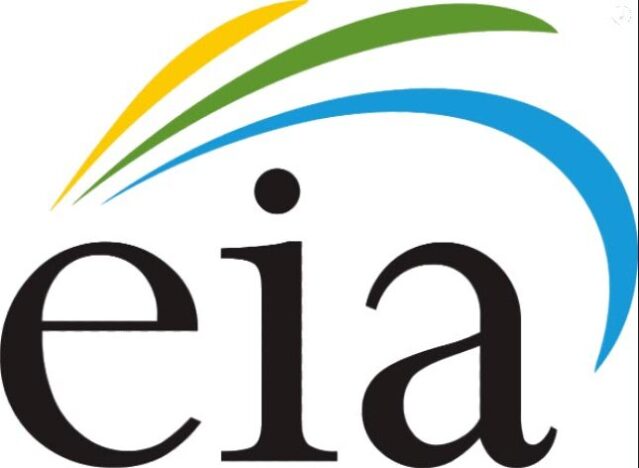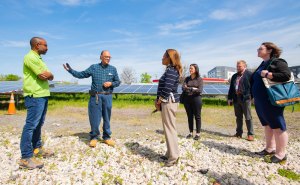
One by one, tiny solar companies abandoned their rooftop ambitions in Prince William, defeated by tangles of red tape in the booming Northern Virginia county.
Undeterred, Ray Masavage, owner of CAVU Solar since 2018, hung in there. Why?
It pained him to see seas of array-less houses in sprawling subdivisions as the planet cooked. And he had faith that officials in the county he calls home yearned to shed the label of worst solar permitting jurisdiction in the state.
Now, he’s hopeful that a Board of Supervisors vote to waive fees associated with new residential solar installations beginning Sept. 1 represents a crack in county bureaucracy. It’s just one piece of a long checklist of potential improvements to streamline solar permitting.
“In terms of diplomacy, this is a big deal,” Masavage said. “I give county officials credit for looking at the problems and doing something about them.”
Get connected
Every morning, thousands of energy professionals turn to our newsletters for the day’s most important news. Sign up for free to get the latest delivered straight to your inbox.
He also praised Solar United Neighbors, an advocacy organization with roots in Virginia, and the Chesapeake Solar & Storage Association, a Mid-Atlantic trade group, for pressuring the county to simplify long-lingering, tedious permitting requirements and boost transparency.
“We’re contractors working 24/7,” Masavage said. “We can’t stop when we’re on a roof somewhere and go back to address a resubmission in Prince William County.”
The county’s balky application website, higher-than-average permitting fees, and nitpicky reviews requiring multiple plan submissions had paralyzed many solar companies and bedeviled homeowners puzzled by the lack of forward movement on planned arrays.
Last December, mounting discontent prompted Solar United Neighbors to invite frazzled homeowners in Prince William to participate in an Action Alert. SUN wanted residents to know that the county — not installers — was to blame for delays and setbacks.
That alert encouraged residents to send complaint letters to both their local county board supervisors and the editors of local newspapers.
Prince William authorities took note.
In February, the county named Mandi Spina as acting director of the Department of Development Services. She replaced — at least temporarily — Wade Hugh, a county employee for 27 years.
In her new role, longtime county employee Spina said she had multiple phone calls with Aaron Sutch of Solar United Neighbors and wanted “to thank him for his continued advocacy of the solar community as well.”
Spina also lauded what’s called the Residential Solar Working Group, which Hugh had rolled out last November. Its 14 members included county staffers and industry representatives intent on repairing the fumbles of the past.
She noted that the impasse began to break when more than 55 stakeholders met on July 12 to hash out their differences.
“This is important as we are committed to partner with industry,” she said.
Sutch, director of SUN’s Atlantic Southeast Region, said he’s encouraged that the campaign has yielded results.
“This feels good and we applaud the county’s decision,” he said. “It’s the first measurable step. But it still has to be followed up with other major improvements.
“Solar is not going away. People in the county want it.”
In late July, supervisors allocated $1.2 million from the county’s year-end savings to a one-time fee reduction on new solar installations through June 2024.
Earlier this month, Spina was named deputy director of the Department of Development Services. That followed an earlier personnel shift, when Hugh was promoted and appointed deputy county executive for community development in late June. He now oversees numerous county agencies, including development services, which he used to lead.
The development agency will initiate a budget request for the next fiscal year to extend the waiver beyond the June 2024 deadline, possibly making it permanent, Spina said.
“I understand we are an outlier compared to our neighboring jurisdictions,” she said about the urgency of reducing permit costs and speeding up timelines.
Indeed, by digging into a federal Solar Trace database, Solar United Neighbors researchers confirmed that Prince William’s median solar permitting fee of $586 was more than double that of four surrounding counties, where fees ranged from zero to $200.
As well, between 2018 and 2021, solar permitting took longer in Prince William than it did in Arlington, Fairfax, Stafford and Loudoun counties.
While waiving the permit fee attracted across-the-board kudos, solar contractors and advocates are encouraged by a handful of other actions to be initiated by the county because of the due diligence of the working group.
For instance, Prince William is issuing a standard list of pre-approved solar components, which will save the industry from having to submit safety compliance listings with each application.
In addition, the county and industry representatives are jointly designing what’s called a residential solar county typical plan. This will eliminate the need for engineers to sign and seal documents because all pertinent information is already included. Instead of dragging on, review time is limited to five business days.
The county is also on track to adopt a pilot program for Solar APP+, a tool developed by the National Renewable Energy Laboratory to standardize the rooftop permitting process.
Solar APP+ is deployed widely in California and Arizona. In Virginia, Prince William would join Richmond, Culpeper County and Harrisonburg, three other jurisdictions testing it on trial runs.
Warming to the online application would be fantastic for smaller operators, advocates say. The conversion would allow all players to be on the same page because the software integrates with existing government regulations, automates plan reviews and provides final signoff of inspections.
“I am confident that” these upgrades “will provide a wide range of options to alleviate frustration surrounding the time and cost to permit in Prince William County,” Spina said.
Sutch said the county of 484,000 residents could be a solar haven if updated policies fulfill the promise of matching contractors and homeowners.
“We feel we’re 40% to 50% of the way there,” he said about busting up the logjam. “This is proof that if you are persistent enough and know the levers of power, you can make a difference. Now, we want to hear positive stuff.”
“We’ve seen tremendous growth with solar projects,” Spina said. “And we know that growth is going to continue.”
Successful applications for installations, which stood at just 14 in 2016 and 19 in 2017, leaped to triple digits — 149 — by 2018. Except for a setback caused by the pandemic, they have ramped up at a steady clip.
By 2022, applications for solar projects had exploded to 1,087 — roughly quadrupling the 2021 total of 274. Each one required both an electrical and a structural permit.
Hugh stood by the rooftop solar data he compiled, although advocates questioned the validity of his records. They constantly questioned why it took so long to greenlight projects — which often didn’t happen until a developer made a second try. Each repeat submission added roughly $100 to the permit cost.
Ideally, developers desire approval within a month for the sake of efficiency and to keep installation costs close to the estimate provided to homeowners. They had to walk away when waits were interminable, thus rendering projects cost-prohibitive.
Masavage is a licensed pilot whose company, CAVU, is shorthand for the aviation term “clear and visibility unlimited.” Prince William’s efforts to expedite permitting are encouraging him to double down.
“To have all of these homes that are perfect candidates for solar is an amazing dream,” he said. “We’re facing a world crisis and, as installers, we have the ability to do something about it.”
Spina is optimistic that the changes will lure solar contractors to the county — and allow the local government to meet its strategic goals of sustainable energy consumption.
Still, some installers remain content to keep their distance.
Nolie Diakoulas, who heads up 10-year-old Virginia Beach-based Convert Solar, expanded his small business’ reach statewide three-plus years ago as interest in renewable energy swelled.
However, he began second-guessing his forays into Prince William when the hurdles proved constant and insurmountable.
Diakoulas backpedaled when basic fees connected to permitting escalated beyond $1,000, too big for an installation to be profitable. He figured the county was a better fit for Ion, Tesla and other solar giants with access to a cadre of internal system designers, engineers and other specialists.
The recent county turnaround isn’t even on his radar.
“We have stopped installing in Prince William County,” he said, “so I have not been keeping up with the news.”



